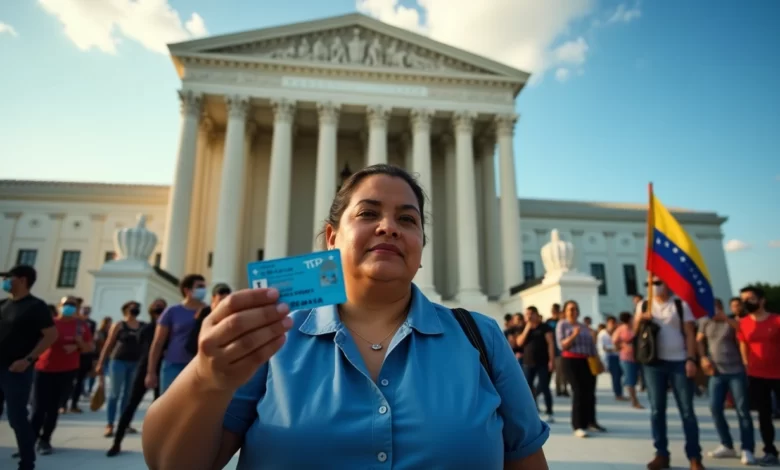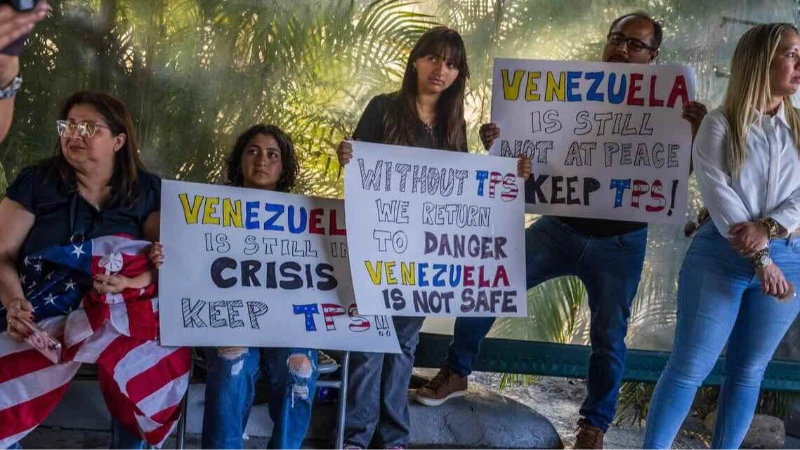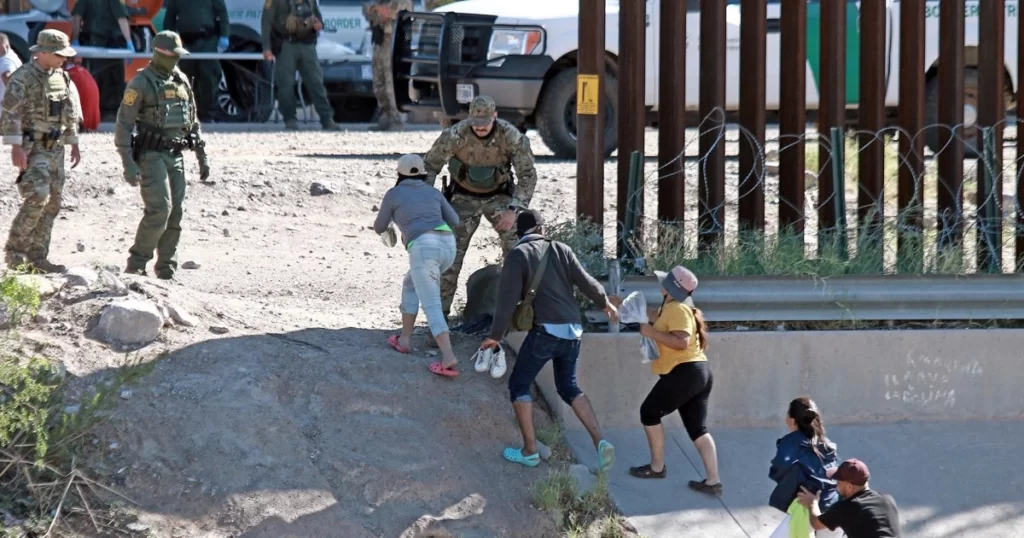Supreme Court Backs Trump Plan to End Venezuelan

Supreme Court Backs Trump Plan to End Venezuelan Protection Status
The Supreme Court’s recent decision could drastically change the lives of 350,000 Venezuelans who currently live in the United States. This ruling now allows the Trump administration to cancel Temporary Protected Status (TPS) for these residents, which might lead to their deportation. Legal experts call this the “largest single action stripping any group of non-citizens of immigration status in modern U.S. history.”
Our team has watched the Supreme Court’s decisions closely as they affect vulnerable groups throughout America. The justices have now enabled a major reversal of the Biden administration’s TPS extension, which started in March 2021 and continued through January 2023. This Supreme Court ruling comes at a crucial moment when Venezuela faces a complex economic and political crisis that has forced more than 7.7 million people to leave their country since 2013.
Supreme Court lifts protections for 350,000 Venezuelans

The Supreme Court released an emergency order Monday that allows the Trump administration to terminate Temporary Protected Status (TPS) for Venezuelans living in the United States. This ruling lifts a lower court’s previous restriction that stopped the administration from ending these protections during ongoing litigation.
Homeland Security Secretary Kristi Noem sparked this legal conflict in February by reversing former President Biden’s TPS extension for Venezuelans. The extension originally lasted until October 2026. Noem stated that “Venezuela no longer continues to meet the conditions” for the 2023 designation. She deemed it “contrary to the national interest” to let Venezuelan nationals stay temporarily in the United States.
A San Francisco federal judge blocked this termination in March because ending the program was “predicated on negative stereotypes.” Notwithstanding that, the Supreme Court’s intervention now lets the administration’s policy continue while litigation proceeds.
UCLA School of Law’s
The Supreme Court’s brief order came with minimal explanation, which typically happens in emergency appeals. Justice Ketanji Brown Jackson stood alone in noting her dissent.
TPS recipients benefit from work authorization, deportation protection, and travel authorization. Hundreds of thousands of Venezuelans might face deportation through normal legal processes without these safeguards. They can still pursue other options like asylum to remain in the United States.
UCLA School of Law’s Center for Immigration Law and Policy co-director Ahilan Arulanantham called this “the largest single action stripping any group of non-citizens of immigration status in modern U.S. history.” He expressed shock that the Supreme Court authorized it “in a two-paragraph order with no reasoning.”
The Department of Homeland Security celebrated the court’s decision as a “win for the American people and the safety of our communities.”
Trump administration reverses Biden-era TPS extension

The Biden administration made one of its most important humanitarian moves in its final days. Secretary of Homeland Security Alejandro Mayorkas extended Temporary Protected Status (TPS) for Venezuela on January 17, 2025. This extension would protect approximately 607,000 current Venezuelan TPS beneficiaries who could legally stay in the United States until October 2, 2026.
The protection didn’t last long. The new Homeland Security Secretary Kristi Noem was quick to change direction after taking office. She canceled the extension on February 3, 2025 and ended the 2023 TPS designation for Venezuela. The Department of Homeland Security backed Noem’s decision, stating that “Venezuela no longer continues to meet the conditions” for TPS designation. They also claimed it was “contrary to the national interest to permit the covered Venezuelan nationals to remain temporarily in the United States”.
temporary conditions” in Venezuela
This decision put 348,202 Venezuelans who had received protection under the 2023 designation at risk. Their legal status would end on April 7, 2025, right after their work permits expired on April 2, 2025. On top of that, 250,000 more Venezuelans with protection from the 2021 designation would face the same outcome in September.
The two administrations took completely opposite approaches. Biden’s team pointed to “extraordinary and temporary conditions” in Venezuela that made safe return impossible, specifically citing the “severe humanitarian emergency” under the “inhumane Maduro regime”. Trump’s administration claimed Venezuela’s economy, public health, and public safety had improved enough for Venezuelan nationals to return safely.
The National TPS Alliance and Venezuelan migrants took legal action against this reversal. They argued that Noem’s actions went against the Administrative Procedure Act. U.S. District Judge Edward Chen sided with them at first. He stated that Noem’s decision would “inflict irreparable harm on hundreds of thousands of persons whose lives, families, and livelihoods will be severely disrupted”. Chen also raised concerns about the termination being “predicated on negative stereotypes” before the Supreme Court stepped in.
Legal challenges raise questions about executive authority

The Venezuelan TPS legal battle centers on a basic clash over executive power and how courts oversee immigration matters. The conflict started when the National TPS Alliance and several Venezuelan nationals sued to challenge Secretary Noem’s decision that ended their protections.
Plaintiffs built their case on two main constitutional arguments. They claimed Noem broke the Administrative Procedure Act by not following the work to be done while making her decision. The plaintiffs also stated the termination was “unconstitutionally motivated by racial animus” toward Venezuelans.
Judge Edward Chen of the U.S. District Court ruled in favor of the plaintiffs and blocked the termination temporarily. Chen found the secretary’s reasoning behind ending Venezuelan TPS “entirely lacking in evidentiary support”. His ruling stated that linking criminality to Venezuelan TPS holders was “baseless and smacks of racism predicated on generalized false stereotypes”.
The Trump administration strongly fought this court intervention. Their Supreme Court appeal claimed that Judge Chen had “wrested control of the nation’s immigration policy” from the executive branch. The government lawyers pointed specifically to immigration law stating that “there is no judicial review of any determination” regarding TPS designations.
Homeland Security secretary
This law’s wording, they noted, showed Congress wanted to give the executive branch “unreviewable authority over TPS decisions” because of complex foreign policy factors. Yet advocacy groups have successfully pushed courts to take on TPS cases repeatedly.
The plaintiffs argued that courts must “say what the law is”. Their legal team stated that the TPS statute doesn’t allow the Homeland Security secretary to cancel or reverse an extension. They noted this was the first time a secretary had reversed an extension in the statute’s history.
The Supreme Court granted the government’s request, with Justice Ketanji Brown Jackson being the only one noting her dissent. This decision lets the administration move forward with its policy while legal arguments continue. The case expresses an ongoing struggle between court oversight and executive power in immigration policy.
Venezuelan nationals who now face deep
The Supreme Court’s ruling represents a defining moment in U.S. immigration policy that will affect hundreds of thousands of Venezuelan nationals who now face deep uncertainty. The court has given the Trump administration power to take what lawyers call unprecedented action against a specific immigrant group, even as legal challenges continue. This decision will disrupt communities all over America where these 350,000 people have built their lives, started businesses, and raised families.
The case explains the complex relationship between executive power and judicial oversight in immigration matters. The law gives the executive branch “unreviewable authority” over TPS decisions, which clashes with the judicial branch’s traditional role of interpreting the Constitution. These fundamental issues remain unresolved as cases move through lower courts.
Venezuelan immigrants must now deal with a deadline that’s coming up faster than expected. Their legal status will expire on April 7, 2025, which creates pressure to find other ways to stay in the United States. Many former TPS holders will rush to file asylum applications to avoid being sent back to a country that still faces major political and economic turmoil.
This ruling goes beyond just one case. It creates a new standard for how quickly one administration can reverse its predecessor’s immigration policies. The stability and predictability of U.S. immigration policy hang in the balance. This Supreme Court decision shows how changes in administration can disrupt the lives of vulnerable immigrant populations caught between political agendas and constitutional principles.

